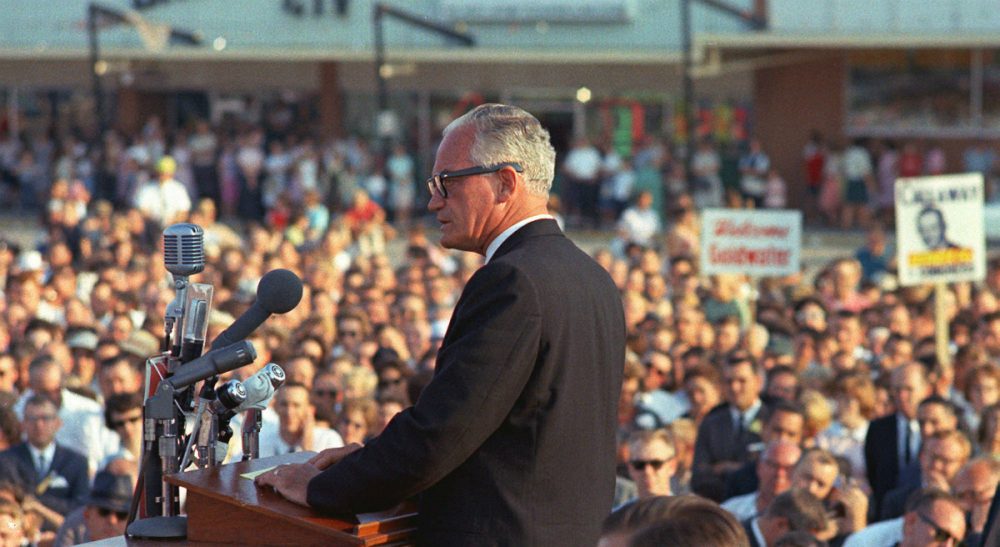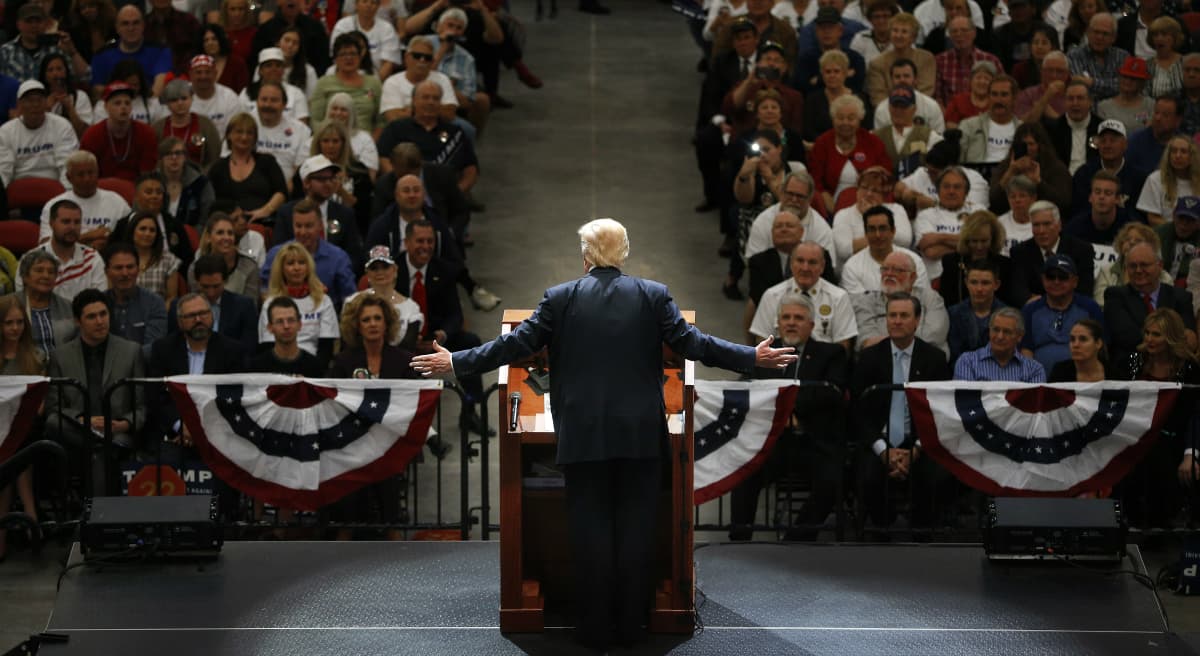Advertisement
Is History Repeating Itself? A Cautionary Tale For The GOP

The Republican primaries “were to exceed in savagery and significance any other in modern politics.” The words are in quotation marks because they are another man’s, about another era, with lessons for us in 2016.
Theodore White’s "The Making of the President 1964," documents that year’s brutal GOP nomination contest, Barry Goldwater’s conservative takeover of the party, and his landslide, 44-state loss to President Lyndon Johnson that fall. Establishment Republicans fear a repeat of catastrophe if Donald Trump is this year’s standard-bearer.
Of course, elite opinion long pooh-poohed the idea of nominee Trump, so let’s stipulate that President Trump isn’t out of the question. But for the sake of argument, suppose President Obama is correct that Trump won’t be elected. It’s obvious that 1964 is a cautionary tale, then, for Republicans.
The Goldwater candidacy was a rebellion by grassroots Republicans who felt lorded over by the party’s moneyed, progressive wing ... not unlike those voters ... who are fueling Trump’s run...
Less obviously, it’s one for Democrats as well.
Reading White’s account half a century on, it’s striking how today’s Republican civil war echoes 1964’s. The Goldwater candidacy was a rebellion by grassroots Republicans who felt lorded over by the party’s moneyed, progressive wing and the presidential nominees it had foisted on them for a generation — not unlike those voters, anchored by working-class whites, who are fueling Trump’s run against a Republican “establishment” it feels has failed them. Indeed, Goldwaterites derided their opponents as the Eastern Establishment; the Establishment had a term for Goldwater partisans — “primitives” — that’s implied in George Will’s put down of Trumpeters as “preferring entertainment to [party] affiliation” and sharing their man’s “aversion to facts.”
Goldwater’s colorful utterances presaged many of Trump’s. He blustered about foreign affairs. (Admittedly, “let’s lob one into the men’s room of the Kremlin” was more eloquent than Trump’s dream to “bomb the sh--” out of ISIS.)
The Arizona senator was a cultural reactionary, voting against the 1964 Civil Rights Act as an affront to state prerogatives. White’s description of that vote -- "the apparent Republican nominee for the Presidency was unalterably opposed to intervention by the Federal Government to secure the human liberties and civil rights of all citizens, black or white” — mimics the stunned objections over Trump’s plan to hang "MEXICANS AND MUSLIMS NOT WELCOME" signs at the border.
Like Trump, Goldwater offended party leaders with his economics, albeit for different reasons. His musings about making Social Security voluntary seemed libertarian nuttiness; Trump’s sweet nothings about entitlements, protectionism and single-payer health care are big-government breaks with party orthodoxy.

Then as now, Republican elders panicked at the insurrection, while rank-and-file Republicans ignored the graybeards’ prediction that this presidential suitor would leave his bride homeless and broken come November. (One difference begs mention: Goldwater possessed an empathy alien to the Donald. Late in the fall campaign against LBJ, a presidential aide was arrested in a gay hangout and charged with disorderly conduct in those pre-gay rights days. “The Goldwater painted as a killer by the Democrats could not bring himself to hurt an individual,” White wrote, “urged by his young men to hammer the issue, to make the most of it as if a gift had been given him — he simply refused.”)
Should Trump follow the arc of summer nomination-autumn repudiation, his backers doubtless will pray that their movement survives to see success later, as did Goldwater’s with the election of Ronald Reagan 16 years later. Meanwhile, Democratic glee at facing an opponent born with a blowtorch where his mouth should be was captured in a recent "Saturday Night Live" skit. In the parody, Hillary Clinton updates the 2008 ghost of herself on the 2016 race. The Clinton of 2008 is dubious of victory, having lost herself to Obama, until 2016 Clinton mentions the Republican frontrunner is Donald Trump.
“Oh my God,” squeals the doppelganger, “we’re going to be president!”
But wait — did I mention the lesson for Democrats from 1964? That part came after White published his book. Having damned the hard-talking Goldwater as a warmonger (the infamous “Daisy” ad being the most memorable example), the re-elected Johnson promptly escalated a war. Vietnam killed 58,000 Americans and turned countrymen against their brothers and sisters. The president who romped to an historic victory in 1964 was hounded out of his reelection bid four years later, hated and with his own party bitterly divided.
Then as now, Republican elders panicked at the insurrection, while rank-and-file Republicans ignored the graybeards’ prediction that this presidential suitor would leave his bride homeless and broken come November.
Today, Clinton is running as a more hawkish successor to the president she served as secretary of state. She (and I) backed the Iraq War, and both of us were wrong. Clinton admirably copped to that mistake. But has she recalibrated her thinking? Obama called his decision to assist the overthrow of Moammar Gadhafi in Libya a chaos-creating bungle; Clinton pointedly declined to follow his example. It’s true that there are instances in which humanity demands intervention; Clinton’s husband apologized for sitting on his hands during the 1990s Rwandan genocide, and some analysts normally averse to intervention agree we should have acted.
But Syria is not Rwanda. The risks of putting Americans into a region of religious hatreds, multiple bad guys, and bombs falling from Vladimir Putin’s planes are greater than any Rwanda posed, as our failed or failing interventions in Iraq and Afghanistan showed. Given her interventionist streak, might President Clinton feel emboldened, having crushed Trump, to roll the dice in places like Syria?
Perhaps she should read "The Making of the President 1968."

